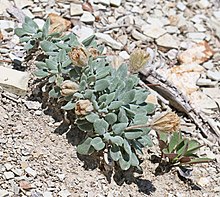| Chamaechaenactis | |
|---|---|

| |
|
Scientific classification
| |
| Kingdom: | Plantae |
| Clade: | Tracheophytes |
| Clade: | Angiosperms |
| Clade: | Eudicots |
| Clade: | Asterids |
| Order: | Asterales |
| Family: | Asteraceae |
| Subfamily: | Asteroideae |
| Tribe: | Bahieae |
| Genus: |
Chamaechaenactis Rydb. |
| Species: | C. scaposa
|
| Binomial name | |
| Chamaechaenactis scaposa | |
| Synonyms [1] [2] | |
| |
Chamaechaenactis, common name fullstem, [3] is a genus of flowering plants in the daisy family. [4] [5] [6]
There is only one known species, Chamaechaenactis scaposa, native to the western United States ( Colorado, New Mexico, Texas, Wyoming, Arizona, Utah) [3] [1] [7] It is a perennial up to 10 cm (4 inches) tall with a thick underground caudex. Most of the leaves are in a basal rosette. Flower heads are usually produced one at a time, with white to pink disc florets but no ray florets. [3]
References
- ^ a b Flann, C (ed) 2009+ Global Compositae Checklist
- ^ The Plant List, Chamaechaenactis scaposa (Eastw.) Rydb.
- ^ a b c Flora of North America, Fullstem, Chamaechaenactis scaposa (Eastwood) Rydberg, Bull. Torrey Bot. Club. 33: 156. 1906.
- ^ Rydberg, Per Axel. 1906. Bulletin of the Torrey Botanical Club 33(3): 155–156 in English
- ^ Tropicos, Chamaechaenactis Rydb.
- ^ Preece, S. J. and B. L. Turner. 1953. A taxonomic study of the genus Chamaechaenactis Rydberg (Compositae). Madroño 12: 97–103.
- ^ SEINet Southwest Biodiversity photos, description, distribution map
External links
| Chamaechaenactis | |
|---|---|

| |
|
Scientific classification
| |
| Kingdom: | Plantae |
| Clade: | Tracheophytes |
| Clade: | Angiosperms |
| Clade: | Eudicots |
| Clade: | Asterids |
| Order: | Asterales |
| Family: | Asteraceae |
| Subfamily: | Asteroideae |
| Tribe: | Bahieae |
| Genus: |
Chamaechaenactis Rydb. |
| Species: | C. scaposa
|
| Binomial name | |
| Chamaechaenactis scaposa | |
| Synonyms [1] [2] | |
| |
Chamaechaenactis, common name fullstem, [3] is a genus of flowering plants in the daisy family. [4] [5] [6]
There is only one known species, Chamaechaenactis scaposa, native to the western United States ( Colorado, New Mexico, Texas, Wyoming, Arizona, Utah) [3] [1] [7] It is a perennial up to 10 cm (4 inches) tall with a thick underground caudex. Most of the leaves are in a basal rosette. Flower heads are usually produced one at a time, with white to pink disc florets but no ray florets. [3]
References
- ^ a b Flann, C (ed) 2009+ Global Compositae Checklist
- ^ The Plant List, Chamaechaenactis scaposa (Eastw.) Rydb.
- ^ a b c Flora of North America, Fullstem, Chamaechaenactis scaposa (Eastwood) Rydberg, Bull. Torrey Bot. Club. 33: 156. 1906.
- ^ Rydberg, Per Axel. 1906. Bulletin of the Torrey Botanical Club 33(3): 155–156 in English
- ^ Tropicos, Chamaechaenactis Rydb.
- ^ Preece, S. J. and B. L. Turner. 1953. A taxonomic study of the genus Chamaechaenactis Rydberg (Compositae). Madroño 12: 97–103.
- ^ SEINet Southwest Biodiversity photos, description, distribution map
External links
